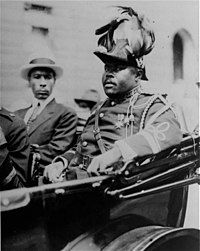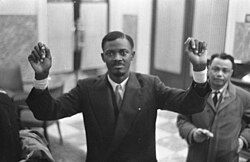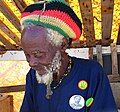Portal:Pan-Africanism
IntroductionWelcome to the Pan-Africanism portal!
Bienvenue sur le portail panafricanisme!     Pan-Africanism is a worldwide movement that aims to encourage and strengthen bonds of solidarity between all indigenous peoples and diasporas of African ancestry. Based on a common goal dating back to the Atlantic slave trade, the movement extends beyond continental Africans with a substantial support base among the African diaspora in the Americas and Europe. Pan-Africanism is said to have its origins in the struggles of the African people against enslavement and colonization and this struggle may be traced back to the first resistance on slave ships—rebellions and suicides—through the constant plantation and colonial uprisings and the "Back to Africa" movements of the 19th century. Based on the belief that unity is vital to economic, social, and political progress, it aims to "unify and uplift" people of African ancestry. (Full article...) Selected articleThe Black Panther Party (BPP), originally the Black Panther Party for Self-Defense, was a political organization founded by Bobby Seale and Huey Newton in October 1966. The party was active in the United States from 1966 until 1982, with international chapters operating in the United Kingdom in the early 1970s, and in Algeria from 1969 until 1972. At its inception on October 15, 1966, the Black Panther Party's core practice was its armed citizens' patrols to monitor the behavior of officers of the Oakland Police Department and challenge police brutality in Oakland, California. In 1969, community social programs became a core activity of party members. The Black Panther Party instituted a variety of community social programs, most extensively the Free Breakfast for Children Programs, and community health clinics to address issues like food injustice. The party enrolled the most members and made the greatest impact in the Oakland-San Francisco Bay Area, New York, Chicago, Los Angeles, Seattle, and Philadelphia. Selected biography
Henry Sylvester Williams (15 February 1869 – 26 March 1911) was a Trinidadian lawyer, councillor and writer, most noted for his involvement in the Pan-African Movement. As a young man he went to North America to further his education, and subsequently to Britain, where in 1897 he formed the African Association to challenge paternalism, racism and imperialism; the association aimed to "promote and protect the interests of all subjects claiming African descent, wholly or in part, in British colonies and other place, especially Africa, by circulating accurate information on all subjects affecting their rights and privileges as subjects of the British Empire, by direct appeals to the Imperial and local Governments." In 1900 Williams organised the First Pan-African Conference, held at Westminster Town Hall in London. In 1903 he went to practise as a barrister in South Africa, becoming the first black man to be called to the bar in the Cape Colony. Selected history The Arab slave trade was the intersection of slavery and trade in the Arab world, mainly in Western Asia, North Africa, East Africa and Europe. This barter occurred chiefly between the medieval era and the early 20th century. The trade was conducted through slave markets in these areas, with the slaves captured mostly from Africa's interior and Southern Europe. Selected cultureAfrican-American culture, also known as Black American culture, refers to the contributions of African Americans to the culture of the United States, either as part of or distinct from mainstream American culture. The distinct identity of African-American culture is rooted in the historical experience of the African-American people, including the Middle Passage. The culture is both distinct and enormously influential on American and global worldwide culture as a whole. African-American culture is primarily rooted in West and Central Africa. Understanding its identity within the culture of the United States it is, in the anthropological sense, conscious of its origins as largely a blend of West and Central African cultures. Although slavery greatly restricted the ability of African Americans to practice their original cultural traditions, many practices, values and beliefs survived, and over time have modified and/or blended with European cultures and other cultures such as that of Native Americans. African-American identity was established during the slavery period, producing a dynamic culture that has had and continues to have a profound impact on American culture as a whole, as well as that of the broader world. Elaborate rituals and ceremonies were a significant part of African Americans' ancestral culture. Many West African societies traditionally believed that spirits dwelled in their surrounding nature. From this disposition, they treated their environment with mindful care. They also generally believed that a spiritual life source existed after death, and that ancestors in this spiritual realm could then mediate between the supreme creator and the living. Honor and prayer was displayed to these "ancient ones", the spirit of those past. West Africans also believed in spiritual possession. Selected imagesOrganisationsAll-African People's Revolutionary Party · African Society for Cultural Relations with Independent Africa · African Unification Front · African Union · African Queens and Women Cultural Leaders Network · Conseil de l'Entente · Convention People's Party · East African Community · Economic Freedom Fighters · Global Afrikan Congress · International African Service Bureau · International League for Darker People · Organisation of African Unity · Pan African Association · Pan-African Congress · Pan Africanist Congress of Azania · Rassemblement Démocratique Africain · Pan Africa Chemistry Network · Pan African Federation of Accountants · Pan-African Freedom Movement for East and Central Africa · Sahara and Sahel Observatory · UNIA-ACL · ZANU–PF
See also
& Festivals Photo by Helinä Rautavaara (1977) Publications
Films and TVAudios and videosDid you know ...that during the tumultuous Year of Africa, seventeen countries gained independence, South Africans began armed resistance to apartheid, and Patrice Lumumba (pictured) gained and lost his freedom?
Selected quotesOn the subject of "Black self-hatred", the African-American scholar and Pan-Africanist Dr. Amos N. Wilson said:
Pan-Africanism topicsCategoriesThings you can do
Related portalsAssociated WikimediaThe following Wikimedia Foundation sister projects provide more on this subject:
Discover Wikipedia using portals | |||||||||||||||||||































